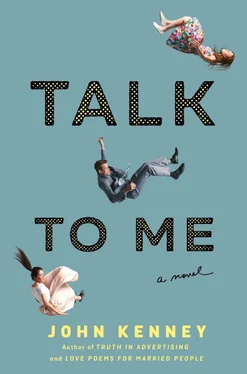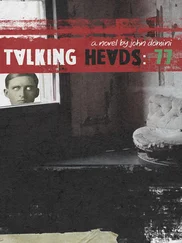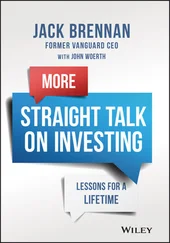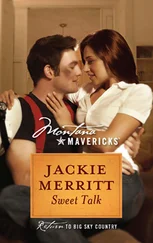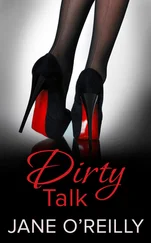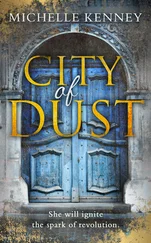Lauren opened Franny’s Google image page. Photo after cool photo of Franny at parties and art openings and galas, speaking on new media at TED NYC. She hadn’t aged. She just looked prettier, had nicer clothes. She looked like someone in a movie. Her middle name was Ford. Frances Ford Grayson.
Lauren hoped Franny would attend. They hadn’t been close but to Lauren’s mind they had been friends. They talked. Well, Franny talked, Lauren listened. So much drama. So much going on. It had been a hard time for Franny. So angry, all the boys, the drugs. She’d met her beautiful mother a few times and even her famous father. Just once, that terrible snowstorm. Maybe time had softened her. Maybe they could be friends. A kind word. Something small. Anything.
• • •
She wanted to strike the right tone. She didn’t want to be made fun of. She didn’t want to be rejected. She just wanted people to come back in June, when the weather was so lovely in western Massachusetts, when the lawns would be lush green, freshly mown, when the campus would be quiet, the kids gone, the dorms used for alums. She attached a link to their class’s NMH Facebook page, where people could comment on whether they were coming, and hit send.
Frances, we have an assignment for you.
They sat in Henke’s office: Henke, Franny, and Toland. Glass walls on three sides, views to the open floor plan, employees plugged in, headphones on. Out the windows, views of the West Side Highway, the Hudson River, New Jersey in the distance.
Franny didn’t know Toland would be there. Toland Figg, New Media Guru. That was her title. Toland was partial to formfitting skirts, tall leather boots that looked expensive, and snug agnès b. sweaters. A collection of noisy bracelets, all silver, on her left wrist, maybe fourteen of them. You heard Toland coming before you saw her. Very little makeup, her high coloring and unusually blue eyes enough of a palette. She did like shiny lips, though, Franny noticed. Long stunning blonde hair that she played with often. She’d previously worked at the William Morris Agency in Hollywood and seemed to know everyone. She had a law degree from Stanford, had briefly directed (rare for a woman) and been nominated for an Academy Award (though it was in documentary shorts, so no one really knew or cared). She was thirty-six or possibly fifty-four. It was impossible to tell without an MRI.
Rumor was that Henke never made a major decision without Toland weighing in. Rumor also had it they slept together, though most found it idle gossip, as they felt Toland was simply out of his league. Henke was Germanic, blondish (though he frequently dyed his hair bright colors), squat, muscular, but it was gym-bought. He was not a natural athlete, moved with none of the grace of one. He had been a chubby boy, bullied at his private school in Berlin, someone who dreamed of reinvention, of high school reunions where the former bullies were now overweight tax attorneys or insurance salesmen or German railway officials, while he showed up driving a Tesla, a lingerie model on his arm, smiling at the strudel-eating wives of his former tormentors.
“We have a story idea for you,” Henke said to his computer screen, after Franny had taken a seat.
“Henke,” Toland said.
Henke looked up, as if awakened, and stared at Franny, blinking, reorienting himself to the non-digital world.
“What do you think?” Henke said.
Franny looked to Toland, who rolled her eyes.
“You haven’t told me anything yet,” Franny said.
Toland said. “We’d like you to write a story about Ted Grayson.”
The feeling was one from grade school. The fear that came during recess, when the mean girls had massed, after lunch, and stared at her, waited for her, taunted her. They’d picked her out, randomly at first, but then because they saw she was afraid. Until she hit one of them one day. The leader. Slapped her hard. They didn’t bother her after that. But the fear didn’t go away.
Scheisse was running stories every day, reposting every few hours. Photos taken as he exited his apartment building, hailed a cab. The iPhone footage of him screaming. But they wanted more.
Franny wanted to leave. She wanted to go outside and walk.
“No,” she said, too forcefully, responding more to the voices in her head than to Henke and Toland.
“I just… I’m not sure I’m the best person for this,” she continued.
“Who better?” Toland asked sweetly.
“I’m not exactly an impartial reporter.”
“We don’t want impartial. We want passion. We want something no one else can get.”
No, she thought again. And yet here was a mild excitement at the prospect, like the moment before jumping off a high diving board, before running into the ocean at Cape Cod, the water so cold.
He’d never do it, Franny thought. “I can’t imagine he’d agree to it,” she said out loud.
“I can,” Henke said. “The network will want it. They’ll need it, in fact. A story by his daughter. The real Ted Grayson.”
“I don’t think you want that story,” Franny said too fast, looking at Toland. But Toland was already three moves ahead. So Toland said nothing and let Franny do the math.
“Wait. You want me to write a bad story about my father?”
“No one said that,” Toland said. “We want the real story.”
Toland came closer, sat on the edge of Henke’s desk.
“I think what we’re talking about here is shame,” Toland said, though for a moment Franny didn’t know if she was talking about her or her father.
“In fact, that may also be the title. ‘Shame.’ Or ‘Shame on you.’ This is the irony of the world we live in. There is no shame. People will do anything, say anything, post anything. And yet when we see transgression of epic proportion, we must shame. We’re primitive. We must publicly stone. It’s the baseball player who bet on the games. The athlete who doped. The congressman who exposed himself to a Girl Scout. It’s the progeny of Chinese billionaires and Saudi kings. It’s the morally lost. It’s not new. It just seems new because we cannot help ourselves. That’s who we are. It’s Shakespeare. He did it all. He did it first. We’re simply in reruns with his work under different names. We love watching because it’s not us. Because we know how easily it could be.”
And here she looked at Franny.
“We know our own demons, don’t we? Deep down. We know we are capable of selfishness, meanness. But we haven’t been caught. And these poor suckers have. This is about the search for redemption in a world that won’t forgive unless you die. We take pity on Reagan now because he’s long dead. Nixon. People talk about China instead of Watergate. What would be interesting is redemption while you’re still alive. Isn’t that what so many people want? To be forgiven?”
Franny had a tic. She ran her index finger across her thumb, picked at the skin. It had caused the nail of her thumb to grow in bumpy. A dermatologist had told her to stop picking at it. But she couldn’t. To the point where she would sometimes wear a Band-Aid because the skin would become raw and exposed. She did it now, felt the sting of it.
She stood quickly and opened the door.
“Okay,” she said.
North Dakota, he’d say to her.
Bismarck, she’d reply.
Mogadishu, he’d say.
Somalia.
She was five, six, nine.
On drives. On walks. On the couch on cold Sunday afternoons, when Ted watched a football game, watched golf. Franny would plop down next to him, just to be near him. Why are they doing that? she’d ask. Who’s that guy? Why does that man have a zebra shirt?
Читать дальше
